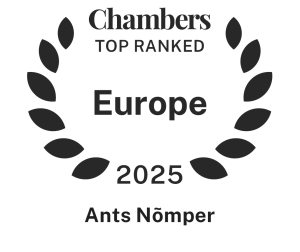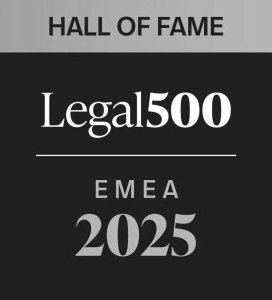Dr. iur. Ants Nõmper is one of the most widely recognised Intellectual Property, IT and Medical Law experts in Estonia whose work is closely linked to the word ‘innovation’. Ants has led a number of innovative cases, including the first patent dispute in Estonia, the first dispute over the responsibility of a media channel over commentaries in Estonia, the first Estonian pharmaceutical advertisement dispute in the European Court of Justice and receiving the first preliminary ruling for a generic pharmaceutical company in Estonia. He is also one of the authors of the textbooks ‘Medical Law’ and ‘Information and Law’ — the first in their related fields to be published in Estonia. Ants is also a member of the .ee and .eu Domain Disputes Committee.
Managing Partner Ants Nõmper is well versed in contentious IP matters, with significant experience handling patent, copyright, and trademark infringement cases. He further represents a broad client base in the pharmaceutical, manufacturing, and technology industries. A client praises him for his “top-notch knowledge and experience”.
Viveo Health launches charity project in Ukraine
BaltCap exits Qvalitas and Unimed
Representing pharmacies in the pharmacy reform
2005
University of Tartu, Estonia
2000
University of Göttingen, Germany
1999
University of Tartu, Estonia
2017
University of Tartu
2013
Estonian Data Protection Authority
2011
Estonian Domain Disputes Committee
2008
AIPPI (International Association for the Protection of Intellectual Property)
2005
Estonian Bioethics Council
2005
Tallinn Childrens' Hospital
2001
University of Tartu
1999
Estonian Bar Association
2020
Juridica: "Penal Liability of a Member of the Management Board of a Care Home, Pursuant to § 123 of the Penal Code. Judgment of the Criminal Chamber in case 1-17-7111"2019
Juridica: "Proposal: Reduce the Liability of Healthcare Professionals to Establish Patient Insurance"2018
Juridica:"The State’s Obligations in Ensuring the Protection of Health: Increasing the Vaccination Rate Using Legal Measures"2017
Juridica, 5, 329-339
2012
Juridica Abstract, 10, 727-738
2011
Juridica Abstract, 2, 162-164
2011
Data Protected. A global report on the status of data protection laws in 2011/2012
2011
The Right to Health Protection in the Estonian Constitution
2010
E-Discovery and Data Privacy: A Practical Guide
2010
What is Wrong with Using Anonymized Data and Tissue for Research Purposes? Blood and Data
2010
Population Genetic Databases: a Comparative Analysis of the Law in Iceland, Sweden, Estonia and the UK
2010
The Estonian Genome Project. Society and Genetic Information: Codes and Laws in the Genetic Era
2010
Estonia and Iceland — Pioneers in Regulating Genebanks. Strafrecht, Biorecht, Rechtsphilosophie
2010
Human Genes Research Act: a Pioneer in Regulating Biomedical Research
2010
On the Legal Regulation of Genetic Testing
2010
Transfer of a Co-Owned Apartment
2009
Võlaõigusseadus III. Kommenteeritud väljaanne (Law of Obligations Act III. Commented Edition)
2009
Karistusseadustik. Kommenteeritud väljaanne (Estonian Penal Code. Commented Edition)
2009
Personal Data Protection Regulation in Estonia and Directive 95/46/EC
2009
The Case of Stigma Abortion
2009
Human Body as an Object of Property and Patent Law — a Path to Modern Slavery?
2008
The Criminal Case of the Doctors of Jehovah’s Witnesses’ Child
2008
Further Development of a Problem: Culpa in Contrahendo and Letter of Intent
2007
The International Comparative Legal Guide to: Pharmaceutical Advertising 2008 and 2007
2007
Meditsiiniõigus (Medical law)
2007
Informatsioon ja õigus (Information and law)
2005
Open consent – a new form of informed consent for population genetic databases
2005
Lessons from European Population Genetic Databases: Comparing the Law in Estonia, Iceland, Sweden and the United Kingdom
Linked Services







